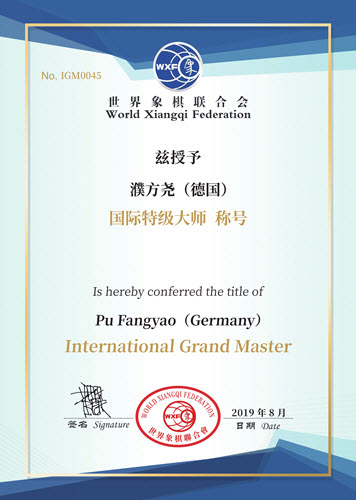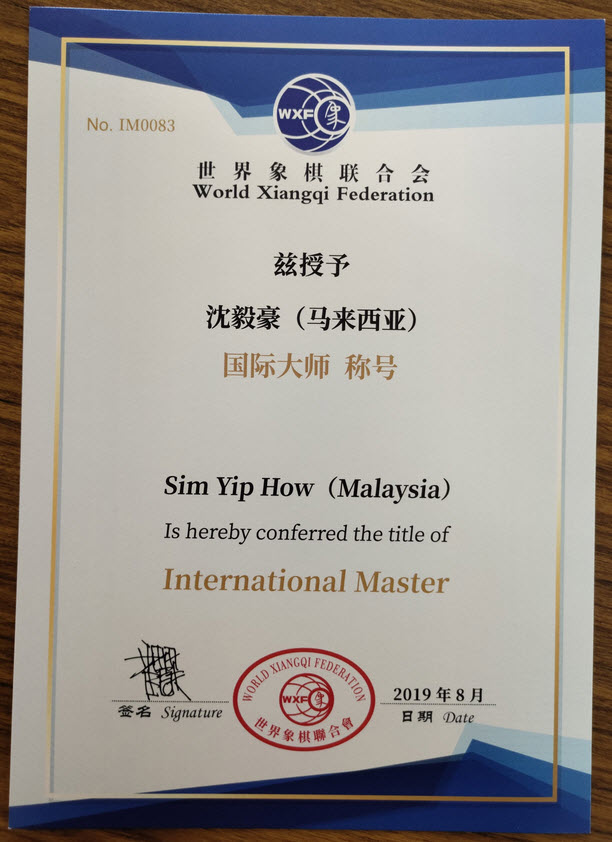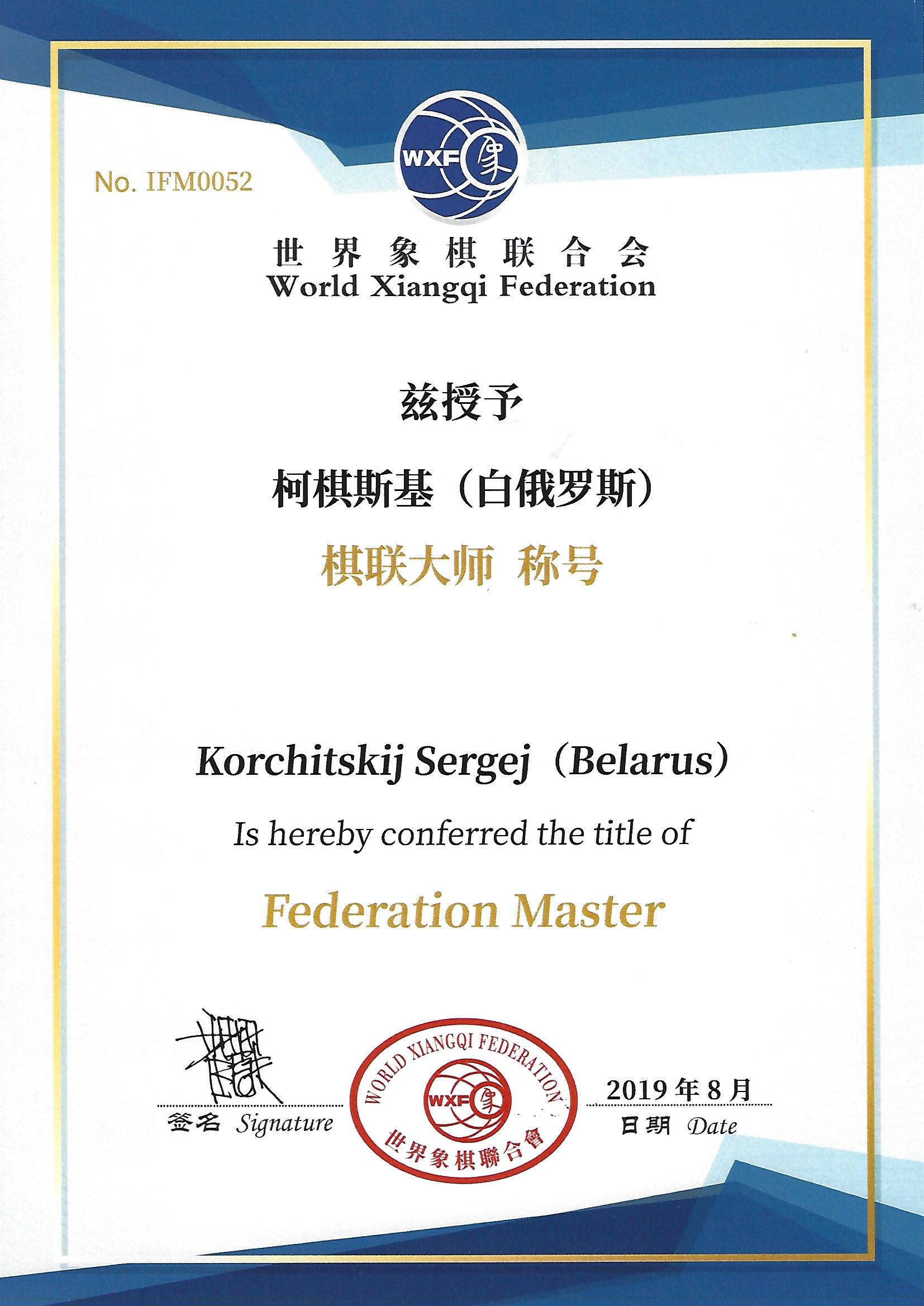Introducing the Titles in Xiangqi (Chinese Chess)
There are several titles that any Xiangqi (Chinese Chess) player can strive to obtain. Titles in Xiangqi need to be discussed on two different levels. On an international scale, the highest and most prestigious title would be the title of International Grandmaster, followed by International Master. On a local scale, most countries have the title of Grandmaster and Xiangqi Master. Earning a title would not only be proof of the player’s strength, but it would also be prestige and honor that could bring monetary benefits.
Awarding titles to players is to be discussed on two different levels: the titles given by a country to their players and the titles conferred by international organizations.
On a local scale, each country would have its own criteria to award titles. The relevant criteria are determined by the local Xiangqi Association overseeing Xiangqi activities in that country.
On an international scale, three international governing bodies can confer international titles to players:
- the World Xiangqi Federation (WXF),
- the Asian Xiangqi Federation (AXF), and
- the European Xiangqi Federation (EXF).
Each federation would issue titles to players who have met the required criteria. However, the titles that were conferred would be restricted to the tournaments that the federation had organized.
Before 2018, there was no unified title of International Grandmaster or International Master. After 2018, the titles for international players from the WXF, AXF, and the EXF were unified by the WXF.
The following article would introduce the criteria for international titles and also the ranking system used in China. It would be impractical to introduce the criteria required to achieve Xiangqi titles in different countries in such a short article. Rather, the Webmaster would like to introduce the things that needed to be achieved for the title of International Grandmaster or International Master. It would also give the reader a rough idea of how hard it is to achieve the title of Grandmaster or Master.
 The article will be presented as follows.
The article will be presented as follows.
Introducing the Titles in Xiangqi (Chinese Chess)
The Required Criteria for an International Title
Eligible Tournaments and their Requirements
Available International Titles
Criteria required for different tournaments/championships
Unification of International Titles in 2018
How hard would it be for a player to earn an international title?
The Required Criteria to become Xiangqi Grandmaster in China
A Peek into the Grading System in China
The Title of Xiangqi Grandmaster in China
The Required Criteria for an International Title
In 2018, the World Xiangqi Federation unified the international titles. It is also the chief (1) (1)governing body responsible for issuing titles. Tournaments by the AXF or EXF would also be granted WXF titles if players met the criteria. Therefore, an EXF Federation Master would become a WXF Federation Master in 2018.
The Webmaster asked around for some help and managed to obtain an English document of the official guidelines. It was translated by Mr. Romeo Xue, Secretary-General of the EXF, who also serves in the WXF. The Webmaster is grateful to Mr. Romeo Xue for his help and for his permission to publish the PDF here. (1)
The official article can be found on the website at the following URL, but it is in Chinese. There is a link which contains more specific information. (2)
The following summary is a short introduction to the requirements by the Webmaster.
Disclaimer: The translation of the original article is by the Webmaster to serve as a guide and introduction. HE WILL NOT BE RESPONSIBLE FOR ANY ERRORS OR CONSEQUENCES THAT MIGHT ARISE FROM ERRORS OR INACCURACIES IN TRANSLATION. THE READER OR PLAYER SHOULD DOUBLE CHECK WITH THE LATEST STIPULATIONS AND OFFICIAL ANNOUNCEMENTS BY THE WXF, AXF, OR EXF, which should be the official standard.
Click here to return to the top of the page.
Eligible Tournaments and their Requirements
The following is a list of the tournaments and open championships whereby you can amass points to become a Xiangqi International Grandmaster or Xiangqi International Master:
- World Xiangqi Championships 世界象棋锦标赛
- World Xiangqi Team Open 世界象棋公开赛
- Asian Xiangqi Championships 亚洲象棋锦标赛
- Asian Xiangqi Open 亚洲象棋公开赛
- European Xiangqi Championship 欧洲象棋锦标赛
Available International Titles
There are only three titles that are given by the WXF:
- International Grandmaster 象棋国际特级大师 (xiàng qí guó jì tè jí dà shī)
- International Master 象棋国际大师 (xiàng qí guó jì dà shī)
- Federation Master 棋联大师 (qí lián dà shī)
Note: The titles apply for both genders.
Criteria required for different tournaments/championships
Please refer to the table given in the PDF by Mr. Romeo Xue.
Click here to return to the top of the page.
Unification of International Titles in 2018
Before 2018, as mentioned above, the WXF, AXF, and EXF issued titles to players who participated in their tournaments and met the required criteria. However, the titles from the three different federations were not unified. A player who was a Grandmaster in one of the Federations might have been a Master in another. It could be confusing when trying to introduce players in such a manner.
Luckily, after 2018, the titles of the federations mentioned above were unified into the same International Title. Grandmasters in one federation would be granted the title of International Grandmasters, even though they might have been International Masters or Federation Masters in other federations.
How hard would it be for a player to earn an international title?
 International titles would serve as recognition of the strength of a player. It would also encourage other Xiangqi players to improve themselves. They can also act as a gauge to compare the strengths of players from all over the world. However, the international titles were confusing before 2018.
International titles would serve as recognition of the strength of a player. It would also encourage other Xiangqi players to improve themselves. They can also act as a gauge to compare the strengths of players from all over the world. However, the international titles were confusing before 2018.
But, how hard would it be for a person to earn an international title?
First of all, you would have to be eligible to participate in the relevant tournaments. To be eligible, you would have to be able to represent your country. Each country would have national Xiangqi associations that are responsible for determining their local grading systems. These local grading systems would determine who was eligible to represent the country. And these countries would have to be members of the relevant federation.
In most instances, the player would have to win a national Xiangqi open or tournament or be placed in the top few positions to represent his/her country.
Secondly, international events where you could earn ‘points’ for international titles ARE NOT NECESSARILY HELD ANNUALLY. Many of these events were biannual.
What are the implications?
Therefore, for a player to pursue the title of International Master, he would have to be at the top in his country for a long period. Only then would he/she be able to represent the country in international events of the SAME FEDERATION and have a shot at earning the title given by the federation. For example, a player representing a country to participate in tournaments by the WXF would have to represent the country regularly. He would also need to perform well enough in the tournament to earn the titles of International Master or International Grandmaster. And as mentioned earlier, the relevant tournament was often not annual events.
This situation is especially evident in the case of China. Generally speaking, China has the world’s strongest Xiangqi players. The strength of the players from China is simply much stronger than the rest of the world. A Chinese Xiangqi Master would often be stronger than an International Grandmaster that was not from China.
Unfortunately, the same Chinese Xiangqi Master might never have the chance in his life to become International Grandmaster or International Master because his results were not good enough for him/her to represent China in international events. Even if he/she could represent China, it would be very hard for him/her to REPRESENT CHINA CONSTANTLY. HE/SHE WOULD THEN HAVE TO DO WELL ENOUGH TO HAVE A SHOT AT AN INTERNATIONAL TITLE. THE SAME PROCESS WOULD HAVE TO BE REPEATED FOR TOURNAMENTS BY OTHER FEDERATIONS.
Therefore, International Grandmasters and International Masters deserve all due respect!
Click here to return to the top of the page.
The Required Criteria to become Xiangqi Grandmaster in China
By far, China remains the strongest Xiangqi country in the world. Professional Chinese Xiangqi players are considered to be athletes. They are governed by the Chinese Xiangqi Association (CXA) who oversees the tournaments and promotion of Xiangqi in China. China also has the world’s most comprehensive system of grading their players.
The highest title that a player can get in China would be the title of Xiangqi Grandmaster, followed by the title of Xiangqi Master. In this article, only the requirements to become a Chinese Xiangqi Grandmaster are discussed. (3)
Disclaimer: The translations of the original articles by the Webmaster is to serve as a guide and introduction. HE WILL NOT BE RESPONSIBLE FOR ANY ERRORS OR CONSEQUENCES THAT MIGHT ARISE FROM ERRORS OR INACCURACIES IN TRANSLATION. THE READER OR PLAYER SHOULD DOUBLE CHECK WITH THE LATEST STIPULATIONS AND OFFICIAL ANNOUNCEMENTS BY THE CXA, which should be the official standard. The criteria are reviewed every four years.
A Peek into the Grading System in China
China has perhaps the most extensive Xiangqi grading system in the world. The official document, in Chinese, explaining the grading system in China can be found here. (4)
In a nutshell, there are many different titles in China. They include:
- Grandmaster (特级大师 tè jí dà shī),
- National Master (国家大师 guó jiā dà shī),
- Federation Master (棋协大师 qí xié dà shī),
- Local Xiangqi Master (地方大师 dì fāng dà shī) and
- Level 1 to Level 16 Xiangqi Players (一级棋士至十六级棋士 yī jí qí shì zhì shí liù jí qí shì).
A Level 1 Xiangqi player would be the strongest among the players with the title of Xiangqi player. The criteria needed to be a Level 16 Xiangqi Player would be extremely simple: know the rules of Xiangqi and be able to conduct a game properly.
Local Xiangqi governing bodies would be responsible for issuing the relevant titles for Level 1 to Level 16 Xiangqi Players and also the title of Local Xiangqi Master. Schools who have earned the merit of being Xiangqi schools (象棋特色学校 xiàng qí tè sè xué xiào) to their resume can also issue the titles of Level 1 to 16 Xiangqi Player. These would be done through applying for tournaments that are recognized by the CXA and thus becoming eligible to issue titles by the local governing bodies. There are strict requirements for the tournaments themselves with many stipulations that must be met.
Another way to earn the title of Level 1 to 16 Xiangqi Player can be done by taking part in the online Xiangqi examinations given by the CXA. There are many other strict stipulations, like the required amount of time for a match cannot be less than 90 minutes, et cetera.
Brief History
Xiangqi was able to take off in the latter part of the twentieth century because of the hard work of many people. Amongst these unsung heroes, the Webmaster would like to introduce the efforts of the late Zhang Xiongfei (张雄飞 zhāng xióng fēi 1912-1962AD) back in the 1950s. Zhang was an active Xiangqi promoter who lobbied for Xiangqi players to be treated as athletes to guarantee their livelihoods. The government would need to take care of the country’s athletes. This act would also ensure the continual development and passing down of Xiangqi from generation to generation. The Webmaster feels that the modern-day world of Xiangqi owes Zhang a huge debt of gratitude for his efforts.
In 1956, the first-ever Chinese National Xiangqi Individual Championships was held, and it marked the first time in history that a unified Chinese champion in Xiangqi was born.
The Chinese Xiangqi Association (CXA), the governing body, was formed in 1962. (5)
Note: The link to the OFFICIAL Chinese Xiangqi Association can be confusing, and this link should be the correct one.
Even though national tournaments began in 1956 and the CXA was formed in 1962, it was until 1982 that the first-ever criteria for grandmasters et cetera were available. There was a short but comprehensive article that could be found on a Chinese website that discussed this issue. However, only the major revisions were discussed. (6)
Click here for a list of registered active Xiangqi players in China in 2020. Click here for a list of the top Xiangqi players by Elo Rating for the first half of 2020. Articles are in Chinese.
Click here to return to the top of the page.
The Title of Xiangqi Grandmaster in China
1982 Criteria for Grandmasters
The first criteria for Chinese Xiangqi Grandmasters were established in 1982 in China. The 1982 criteria were revised several times as the original criteria were too strict. To become a Chinese Xiangqi Grandmaster, you would have to win the Chinese National Xiangqi Individual Championships (CNXIC) three or more times. Before 1982, only Yang Guanlin and Hu Ronghua met the criteria.
Yang Guanlin proposed these very strict criteria and immediately drew the ire of fellow Xiangqi players. It was extremely hard to win the championship, and to win it for three or more times was downright impossible. Only Yang Guanlin, Hu Ronghua, Li Laiqun, Zhao Guorong, Lv Qin, Xu Yinchuan, and Wang Tianyi would be eligible Xiangqi Grandmasters if the 1982 criteria were used.
1984 Revision of Criteria for Grandmasters
 The criteria to become grandmaster was loosened considerably. Instead of having to win the Chinese National Xiangqi Individual Championships three times, the criteria to become a Chinese Xiangqi Grandmaster was changed to:
The criteria to become grandmaster was loosened considerably. Instead of having to win the Chinese National Xiangqi Individual Championships three times, the criteria to become a Chinese Xiangqi Grandmaster was changed to:
- Winning CNXIC once,
- Coming in at a second or third place in CNXIC three times
Beneficiaries of the 1984 Criteria included Li Yiting, Li Laiqun (who would later win CNXIC), and Liu Dahua. Wang Jialiang was also a beneficiary as he had the strength but simply not the luck required to become a grandmaster should the old criteria were used.
1998 Revision of Criteria for Grandmasters
The 1984 criteria were still too hard, and another revision was done in 1998. There were now five ways to become a Chinese Xiangqi Grandmaster:
- Winning CNXIC once
- Being placed in the top six positions FOUR TIMES in CNXIC
- Having placed as 1st Runner Up or 2nd Runner up for two times within three years for CNXIC
- Winning the invitational event for the Chinese Xiangqi Masters Tournament ONCE AND ALSO HAVING A WIN RATE OF 76%
- Winning the Chinese Xiangqi Masters Tournament two times (no winning percentage was required)
2014 Revision of Criteria for Grandmasters
To date, the last revision of the criteria was made in 2014. It relaxed the original criteria further. In 2014, a player could become a Chinese Xiangqi Grandmaster if he met the following stipulations:
- Winning CNXIC once
- Being placed in the top three positions for IMSA events, or WXF tournaments, or being on the team winning WXF team events
- Becoming champion in the Xiangqi division of the Asian Games
- Winning AXF Individual Events, or winning Asian Indoor Events or being on the team that won the team event
The ‘being on the championship team’ criteria has been one of the most heavily criticized criteria thus far.
Click here to return to the top of the page.
References
1. Federation, World Xiangqi. Standards of WXF Player Technical Grading (Trial). Apr 8, 2018.
2. 世界象棋联合会. 世界象棋联合会棋手技术等级标准(试行) . 世界象棋联合会网站. [联机] 2014年Sep月15日. [引用日期: 2020年Sep月27日.] http://wxf.ca/wxfc/index.php/2014-09-13-15-41-37/2014-09-13-16-14-51/979-2018-04-20-02-01-30.
3. 象棋特级大师. Wikiwand. [联机] Should be around 2019年. [引用日期: 2020年Sep月27日.] https://www.wikiwand.com/zh-cn/%E8%B1%A1%E6%A3%8B%E7%89%B9%E7%B4%9A%E5%A4%A7%E5%B8%AB.
4. 中国象棋协会. 中国象棋协会棋手技术等级管理办法. 中国智力运动网. [联机] 2019年Apr月2日. [引用日期: 2020年Sep月26日.] http://api.imsa.cn/news/article/73248/page.
5. contributors, Wikipedia. Chinese Xiangqi Association. Wikipedia, The Free Encyclopedia. [Online] Page Version ID: 904169311, June 30, 2019. [Cited: Sept 25, 2020.] https://en.wikipedia.org/w/index.php?title=Chinese_Xiangqi_Association&oldid=904169311.
6. 缪莹. 回顾象棋特大评定条件,以82年为准,仅7人达标,王天一差点落选!. 象棋微学堂. [联机] 2020年Aug月14日. [引用日期: 2020年Sep月26日.] https://mp.weixin.qq.com/s/qUfg0C6CWw0PhtN333ZINg.
7. 珠江文化. 象棋白皮书 -- 关于象棋现状的调查报告. Guangzhou : 珠江文化, 2019.
